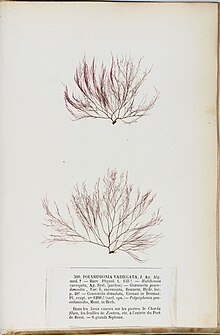Polysiphonia denudata
| Polysiphonia denudata | |
|---|---|

| |
| Polysiphonia denudata specimine | |
| Scientific classification | |
| Clade: | Archaeplastida |
| Division: | Rhodophyta |
| Class: | Florideophyceae |
| Order: | Ceramiales |
| Family: | Rhodomelaceae |
| Genus: | Polysiphonia |
| Species: | P. denudata
|
| Binomial name | |
| Polysiphonia denudata (Dillwyn) Greville ex Harvey
| |
Polysiphonia denudata (Polysiphonia variegate (C.Agardh) Zanardini) is a small red alga, Rhodophyta, growing as tufts up to 20 cm long without a main branch axis.[1]
Description
[edit]Polysiphonia denudata is erect with repeatedly branched axes. Each branch consists of a central axis with 5 to 7 elongated pericentral cells all of the same length. Cortication occurs lower down, these corticating cells grow down in the grooves between the pericentral cells. The holdfast is discoid.[1]
Reproduction
[edit]The plants are dioecious. They bear spermatangia towards the tips of branches. Cystocarps are barrel-shaped when mature borne on a wide short stalk. Tetrasporangia occur in a spiral series in the branches near the tips.[1]
Habitat
[edit]The alga is very rare, grows on rock, stones or other large algae in the low-littoral or below in sheltered sites.[1][2]
Distribution
[edit]Reported from the north of Ireland in 1847, the specimen is in store in the Ulster Museum, Belfast[3] in England from the south coast,[4] Scottish records considered misidentifications,[5] Netherlands to Portugal and West Africa. The Mediterranean and west Atlantic.[1]
References
[edit]- ^ a b c d e Maggs, C.A. and Hommersand, M.H. Seaweeds of the British Isles. Volume 1 Rhodophyta Part 3A Ceramiales The Natural History Museum, London
- ^ Newton, L. 1931. A Handbook of the British Seaweeds. British Museum, London
- ^ Morton, O. 1994. Marine Algae of Northern Ireland. Ulster Museum ISBN 0-900761-28-8
- ^ Batters, E.A.L. 1902. A Catalogue of the British Marine Algae. supplement to the Journal of Botany 40:1 - 107
- ^ Hardy, F.G.and Guiry, M.D. 2003. A Check-list and Atlas of the Seaweeds of Britain and Ireland. British Phycological Society. ISBN 0-9527115-16
Further References
[edit]Bunker, F.StP.D., Maggs,C.A., Brodie, J.A., Bunker, A.R. 2017. Seaweeds of Britain and Ireland. Second Edition. Wild Nature Press, Plymouth. UK. ISBN 978-0-9955673-3-7
